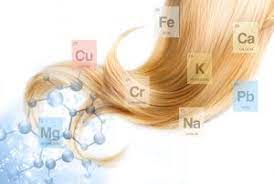Why test for minerals?
Minerals are essential for growth, healing, vitality and wellbeing. They provide structural support in bones and teeth and they maintain the body’s acid-base balance, water balance, nerve conduction, muscle contractions and enzyme functions. Minerals participate in almost every metabolic process in the body – they are the true ‘spark-plugs’ of life.
Ideally we should get all the minerals we need from a balanced diet. Unfortunately, this is rarely possible in today’s world. Modern farming techniques, fertilisers and depleted soils reduce the mineral content of foods. Environmental toxins, chemical food additives and stressful lifestyles also have a detrimental effect on our nutritional status. Consequently, we need to test and monitor our nutritional needs more than ever.
What is a Hair Tissue Mineral Analysis (HTMA)?
HTMA is an analytical test that measures the mineral composition of hair. It is regarded by many doctors, nutritionists and naturopaths as one of the most valuable screen tools available in everyday and preventative health care.
InterClinical Laboratories provides reliable clinical data on over 35 nutrient and toxic minerals and over 26 significant mineral ratios.
Why biopsy hair tissue?
Hair is a body tissue made up of mostly dead, keratinized cells fused together. The shaft of the hair is the portion that projects from the skin surface. The root of the hair, below the skin surface, contains living matrix cells from which the hair grows. Matrix cells depend on the blood supply for nourishment and growth. As they grow and divide, minerals are keratinized into the growing hair shaft, creating a permanent record of metabolic activity and exposure to toxic elements.
Mineral concentrations in the hair can provide a reliable indicator of mineral stores in the whole body. If your health, diet or environment has created a mineral imbalance or toxic mineral excess, it will be recorded in the hair shaft. Research has shown that hair mineral levels reflect stored mineral levels in other body tissues.
Causes of mineral imbalances
- Improper eating habits: Fad diets and diets high in refined carbohydrates, sugar, salt, alcohol and saturated fats can lead to mineral deficiencies and excesses. Even the mineral content of a healthy diet can be deficient if foods are grown on nutrient-poor agricultural lands.
- Stress: Both physical and emotional stress can lead to mineral imbalances. B-complex vitamins, zinc and magnesium are lost in greater quantities when you are stressed. You also absorb less nutrients from your food. Sports people often have a higher requirement of certain nutrients.
- Medications: Many deplete the body’s store of nutrient minerals and can increase levels of toxic minerals. Medications such as diuretics, the oral contraceptive pill, antacids and aspirin can all cause vitamin and mineral deficiencies.
- Pollution: Toxic minerals such as lead, mercury and cadmium can interfere with mineral absorption and increase mineral excretion. They build up in our bodies from sources such as: air pollution, car exhaust, cigarette smoke, unfiltered water, dental amalgams, copper and aluminium cookware, hair dyes and antiperspirants. Toxins have also entered the food chain, contaminating some of our foods. It is almost impossible these days to avoid some exposure to toxic minerals.
- Genetic and individual factors: A predisposition towards certain mineral imbalances, deficiencies and excesses can be inherited from parents. Certain individuals can also inherit a higher requirement than normal for particular nutrients to maintain good health.
- Nutritional supplements: Supplements can also lead to mineral excesses and deficiencies.
For example, excess calcium intake can cause phosphorus and magnesium deficiency. Continued magnesium deficiency increases sodium levels and eventually causes vitamin A deficiency.
If you’re ready to change your life for the better, book here for a complimentary 20-minute health assessment. If you’re unsure, email me at sal@saltheutritionist.com.au for a chat. Some health funds and payment plans available.
Tags
[tags_all_in_one number=”20″ smallest=”11″ largest=”11″ unit=”px” separator=” ” orderby=”name” order=”asc” post=”true”]


Download My Top Tips 'Get Out Of The ADHD Loop Now'
Great, you're in. Check your inbox for your free resource. Save this email address.
Look out for our email newsletter packed with free resources, blogs and tips. Unsubscribe at any time.